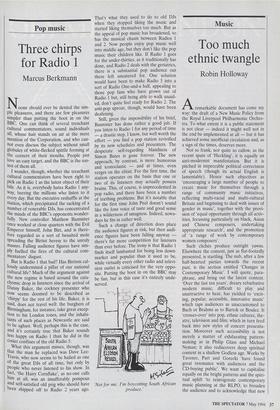Pop music
Three chirps for Radio 1
Marcus Berkmann
Noone should ever be denied the sim- ple pleasures, and there are few pleasures simpler than putting the boot in on the BBC. One can think of several trenchant cultural commentators, sound individuals all, whose hair stands on air at the mere mention of the Corporation, and who can- not even discuss the subject without small globules of white-flecked spittle forming at the corners of their mouths. People just love an easy target, and the BBC is the eas- iest of them all.
I wonder, though, whether the trenchant cultural commentators have been right to pick on Radio 1 as the latest object of their bile. As it is, everybody hates Radio 1 any- way, barring the millions who listen to it every day. But the executive reshuffle at the station, which precipitated the sacking of a number of venerable DJs, has concentrated the minds of the BBC's opponents.wonder- fully. New controller Matthew Bannister once worked at close quarters with the Evil Emperor himself, John Birt, and is there- fore regarded as a sort of besuited mole spreading the Birtist heresy to the unruly masses. Falling audience figures have sim- ply fuelled the fires of the cultural com- mentators' disgust. But is Radio 1 that bad? Has Birtism cal- lously undermined a pillar of our national cultural life? Much of the argument against the new regime is based around the cata- clysmic drop in listeners since the arrival of Danny Baker, the cockney presenter who now seems doomed to be described as Chirpy' for the rest of his life. Baker, it is said, does not travel well: the burghers of Birmingham, for instance, take great excep- tion to his London tones, and the inhabi- tants of such places as Newcastle are said to be aghast. Well, perhaps this is the case, and it's certainly true that Baker sounds less happy on Radio 1 than he did in the cosier confines of the old Radio 5.
What this argument misses, though, was that the man he replaced was Dave Lee- Travis, who now seems to be hailed as one of the great DJs of all time, but only by people who never listened to his show. In fact, 'the Hairy Cornflake', as no-one calls him at all, was an insufferably pompous and self-satisfied old prig who should have been shipped off to Radio 2 years ago.
That's what they used to do to old DJs when they stopped liking the music and started liking themselves too much. But as the appeal of pop music has broadened, so has the musical chasm between Radios 1 and 2. Now people enjoy pop music well into middle age, but they don't like the pop music their children like. If Radio 1 goes for the under-thirties, as it traditionally has done, and Radio 2 deals with the geriatrics, there is a substantial pop audience out there left uncatered for. One solution would have been to make Radio 5 into a sort of Radio One-and-a half, appealing to those pop fans who have grown out of Radio 1 but, still being able to walk unaid- ed, don't quite feel ready for Radio 2. The anti-pop uproar, though, would have been deafening.
Still, given the impossibility of his brief, Bannister has done rather a good job. If you listen to Radio 1 for any period of time — a drastic step, I know, but well worth the effort — you find a pop station revivified by its new schedules and presenters. The desperate self-regarding blandness of Simon Bates is gone forever. The new approach, by contrast, is more humorous and iconoclastic — and at times, even verges on the elitist. For the first time, the station operates on the basis that one or two of its listeners may actually possess brains. This, of course, is unprecedented in pop radio, and there have been a number of teething problems. But it's notable that for the first time John Peel doesn't sound like the lone voice of taste and good sense in a wilderness of smugness. Indeed, nowa- days he fits in rather well. Such a change of direction does place the audience figures at risk, but then audi- ence figures have been falling anyway there's far more competition for listeners than ever before. The irony is that Radio 1 finds itself lambasted for being less down- market and populist than it used to be, while virtually every other radio and televi- sion outlet is criticised for the very oppo- site. Putting the boot in on the BBC may be fun, but in this case it's entirely unde- served.
`Not for me. I'm boycotting South African produce.'


















































 Previous page
Previous page